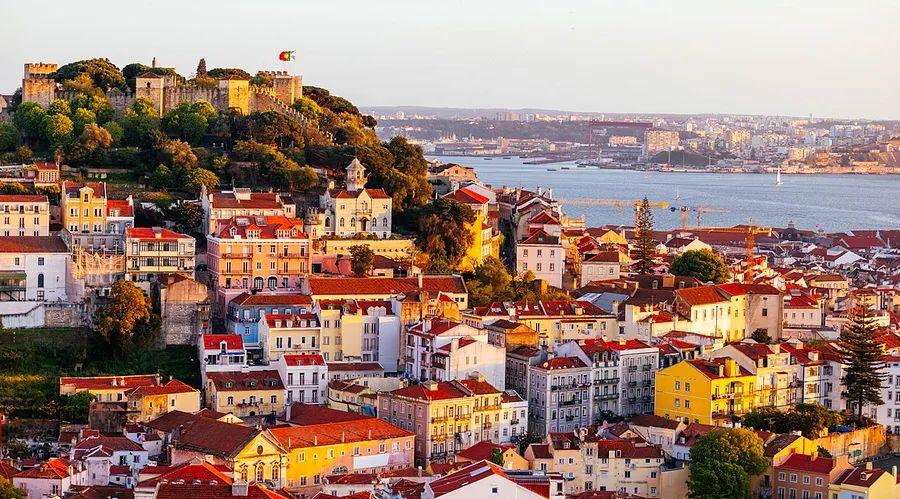Why Portugal is becoming one of the top destinations for expats

With the mantra of "work to live" over "live to work," the allure of over 1,100 miles of stunning coastline and the abundance of pastéis de nata makes settling in Portugal incredibly attractive.
For anyone contemplating a major life change—selling everything and relocating to sunnier climates—moving to Portugal might be more feasible than you think.
Portugal has long been one of Europe’s easiest countries to obtain residency, offering several visa options for non-EU nationals (as well as those from the European Economic Area and Switzerland). A new visa for digital nomads now makes it even more accessible to remote workers.
Many Americans who have made the move cite reasons like affordable healthcare and the desire to escape gun violence, in addition to the appealing lifestyle benefits—such as a relaxed pace of life, mild climate, and easy access to travel across Europe.

One way to get there: The D7 visa
Grace Veach, who now teaches remotely for a Florida university from her new home near Coimbra, a scenic city by the river in central Portugal, decided to leave the U.S. after the tragic Sandy Hook shooting in 2012.
"I knew I wanted to be somewhere where gun violence wasn’t a constant fear," says Veach, 59.
However, the move took some time due to various life factors. In 2021, Veach and her husband, along with their 27-year-old son and family dog, finally relocated to Portugal.
None of them had ever visited Portugal before, Veach says, as their planned scouting trips were canceled due to the pandemic.
The D7 visa requires holders to convert it into a residency application within four months of arrival in Portugal. It also mandates that visa holders spend 16 months of the first 24 months in Portugal, subject to certain conditions, and this process allows for work opportunities in the country.
After five years, D7 visa holders can apply for Portuguese citizenship. The application process typically takes about six months.

Alternative ways to live in Portugal
The D7 visa is just one of several visa options currently available to help facilitate a move to Portugal.
For those who don’t wish to spend much time in Portugal, the Golden Visa allows holders to live in the country for just seven to 14 days a year. It also provides access to Portugal’s National Health Service and a pathway to citizenship after five years. However, new restrictions introduced in 2022 limited the areas where property investments can be made, making it less appealing for some.
Portugal’s newest temporary-stay visa, launched on October 30 and often referred to as the “digital nomad” visa, is designed to help remote workers relocate to Portugal temporarily. The visa allows stays of up to one year (12 months), provided applicants can demonstrate monthly earnings of at least 2,820 euros (roughly the same in dollars) from a company based outside Portugal.
"There’s a lot of buzz around this visa in the digital nomad community," says Danish Soomro, the founder of Visadb, a comprehensive visa database that tracks over 800 residency options globally.

Soomro, who also founded a private digital nomad group on Facebook with over 155,000 members, highlights Portugal as one of the top destinations for remote workers. Other popular countries in this space include Greece, Spain, Croatia, and Cyprus, all known for their "warm weather, reliable internet, and strong community."
"Previously, digital nomads used other types of Portuguese visas as a workaround," Soomro explains, noting that the D7 visa was originally designed for pensioners with passive income, not for remote workers.
The D7 visa requires applicants to obtain a Portuguese tax identification number, unlike the digital nomad visa, which does not have this requirement.
Digital nomad visa holders, however, are not eligible for Portugal’s healthcare system and must provide proof of their own health insurance as part of the application. Additionally, this visa does not grant a direct path to Portuguese citizenship.

Understanding the application process
For her D7 application, Veach used her retirement savings, pensions, and social security to meet the visa’s income requirements.
While she could have navigated the application process on her own, Veach chose to hire an immigration assistant from Porto-based Relocate to Portugal for help with the paperwork.
Veach also credits Deborah Dahab’s Master Your Move coaching program and ExpaCity, an online community dedicated to helping people move to Portugal, for smoothing out the application process and easing her transition to life in Portugal.
She also joined Facebook groups like Americans & FriendsPT, along with local expat communities in Coimbra, to gather advice. With nearly 35,000 members, the private group provides a space for members to share their experiences, challenges, and tips for relocating to Portugal.

Bill Mauro, 58, and his husband, Marcus Laurence, 51, both retired early from careers in insurance and healthcare sales before relocating from their home in Jim Thorpe, Pennsylvania, to Lisbon in 2019.
The couple applied for the D7 visa and handled the entire application process on their own, using resources from the Americans & FriendsPT Facebook group.
"We followed the guidelines exactly, and it took six months from our decision to move until we got our visa and arrived in Portugal in October 2019," Mauro recalls. The couple sold all their possessions in the U.S. and arrived in Portugal with only six suitcases.
Mauro highlights several factors that make Portugal appealing, including affordable, high-quality healthcare, safety, recognition of their marriage and LGBTQ+ rights, and the country’s abundant sunshine with over 300 sunny days a year.
The couple has since moved from Portugal’s bustling capital to their “dream home,” a traditional schist stone house in the mountaintop village of Salgueiro da Lomba in central Portugal. They bought it for 165,000 euros in 2021 and are currently renovating it.

'We couldn’t afford health insurance'
Glen Cook, a retired high school music and drama teacher, mentions the “outrageously high cost of healthcare in the US” as one of his primary reasons for moving abroad.
Cook, 59, moved to Portugal in 2018 on the D7 visa with his husband, Todd Doleshall (also retired), and their teenage son at the time.
"We had the financial means to retire, but we were too young to qualify for Medicare and couldn’t afford private health insurance," Cook explains.
The couple explored other countries for relocation, including Ecuador, Mexico, Costa Rica, Italy, and Ireland, but ultimately chose Portugal because it best matched their needs.
Shortly after settling in Portugal, they had the opportunity to see firsthand what benefits they would receive from the country's National Health Service.
"We faced a serious medical emergency that would have likely bankrupted us in the US," Cook shared in an email to Dinogo Travel.
"Here, everything was fully covered. I’m still amazed that we weren’t charged a single cent for any of the care, which included a month in the ICU and over four months of inpatient rehabilitation," Cook says.
Cook hired an immigration assistant to assist with the application process and recommends that others who feel overwhelmed by the paperwork do the same.
Visa assistance services are thriving
Although it’s possible to apply for visas independently, the process in Portugal can be made much simpler with the support of a visa application service.
Sara Galis, of Welcome To Portugal, a Lisbon-based company that aids with the visa process—from helping with paperwork in your home country to setting up a bank account in Portugal and acting as a fiscal representative—says demand for visa services from Americans is soaring.
Galis reports that 60% of her clients are from the United States, with the majority applying for the D7 visa.
"For Americans, the currencies are almost equal right now, making Europe even more appealing," says Galis, who launched her business in 2021.
"They want to have a foot in both worlds. Portugal is seen as a very safe place to live," Galis adds.
Gail Aguiar of Relocate to Portugal mentions that she has noticed growing interest from Canadian and British citizens seeking to move to Portugal as well.
Aguiar attributes spikes in demand for her firm’s services to major global events, including the 2016 U.S. presidential election, the economic downturn in Brazil, and political scandals in the country.
She notes that while most of her clients are American, Brazilians make up the largest group of migrants to Portugal. According to Portugal's 2021 immigration report, Americans accounted for just 6,885 of the 698,887 immigrants that year, whereas 204,694 Brazilians and 22,782 Chinese citizens moved to the country.
Adjusting to life in Portugal can take time and patience
Securing a visa is only the first step—settling into a new country and adjusting to a different lifestyle can present its own set of challenges.
Mauro shares that learning Portuguese has been the toughest part of their move, even after completing the 150-hour government-funded language course for foreigners.
"Sometimes we miss the comfort of the country we grew up in," Mauro reflects. "Adapting to cultural differences in areas like home renovation and healthcare has been difficult, but we try to embrace these challenges as opportunities for growth."
He emphasizes that despite what you may see on some social media platforms, "Portugal is not a magical place that fixes all your problems."
When reflecting on their ongoing transition, two key words come to mind, he says: "Appreciate and assimilate. We are grateful for how Portugal has embraced us as immigrants, welcoming us into this beautiful country. At the same time, we’ve made an effort to assimilate by learning the language, culture, and history."
Veach shares that forming connections has been essential in adapting to her new life in Portugal. She has met several people through Facebook groups and real-life networking events.
"I’m an introvert, but I’ve made a conscious effort to attend group gatherings in order to meet people," she says. "It doesn’t happen naturally when you don’t speak the dominant language of the people around you."
Despite the challenges, Veach expresses how much she enjoys the sense of security in Portugal, the distance from the "toxic political climate in the US," and the freedom to explore Europe during her downtime.
The slower pace of life that many people seek when they move to Portugal does have its drawbacks, according to Cook.
"One of the first words we learn is 'amanhã,' which means 'tomorrow,'" he says. "But in practice, it doesn’t mean tomorrow. It means, 'When I get around to it.'"
Additionally, the bureaucracy in Portugal is, in Cook’s words, "widespread."
"There are more forms, processes, permits, and licenses than you could ever imagine," Cook remarks.
As for what Cook misses about the US, he says those things are becoming fewer over time, often being outweighed by the many things he enjoys about life in Portugal.
"But I’d give anything for some authentic Mexican food right now," he says.
Correction: The earlier version of this article incorrectly stated certain visa requirements for living in Portugal, as well as the investment threshold for its visa program.

1

2

3

4

5
Evaluation :
5/5